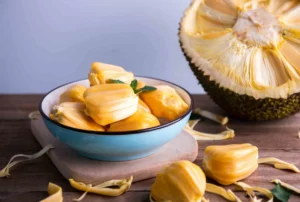
Artocarpus heterophyllus is a tree native to India that produces jackfruit, which are the largest edible fruit in the world. These unique-looking fruits can weigh as much as 110 pounds and are covered in spiky projections.
Jackfruit is an excellent source of many nutrients including vitamin C, B vitamins, magnesium, and potassium and is packed with health-promoting antioxidants. According to some research studies, jackfruit may have blood sugar-lowering effects and contains nutrients that may support heart health and lower the risk of several health conditions.
Read on to learn more about the potential health benefits and nutrition of jackfruit and how to incorporate this healthy fruit into your diet.
May Benefit Blood Sugar Regulation
Jackfruit contains nutrients and phytochemicals with blood-sugar lowering properties. For example, jackfruit is a good source of fiber, which helps slow digestion and the speed at which glucose enters the bloodstream.
The fruit is also rich in proanthocyanidins and flavonoids, which are plant compounds with powerful antidiabetic properties. Study findings suggest that these compounds may help reduce blood sugar levels by inhibiting certain enzymes involved with starch digestion and blocking the absorption of starch in the digestive tract, which can decrease post-meal blood sugar levels.
Though research is limited, a 2021 study found that when people with type 2 diabetes consumed one ounce of jackfruit flour daily for 12 weeks they experienced significantly greater reductions in their fasting and post-meal blood sugar levels and levels of the long-term blood sugar control marker hemoglobin A1C from baseline compared to participants who consumed a placebo flour.
Keep in mind that green jackfruit flour is made from unripe jackfruits, so ripe jackfruits may have a different impact on blood sugar. For this reason, more research is needed to fully understand how jackfruit products, including fresh jackfruit, impact blood sugar regulation.
In addition to jackfruit flesh, jackfruit seeds, which are edible, may also improve glycemic control. Findings from studies conducted in animals suggest that the fiber and carotenoid antioxidants found in jackfruit seeds may help lower blood sugar levels. However, like jackfruit flesh, more studies are needed to confirm the potential antidiabetic effects of jackfruit seeds.
May Boost Heart Health
Jackfruit is rich in several nutrients important for heart health, including potassium, a mineral that’s essential for blood pressure regulation. Potassium regulates blood pressure by relaxing or dilating blood vessels and promoting sodium excretion through the urine.
Studies show that people with low potassium intake are more likely to have high blood pressure than people with adequate potassium intake. What’s more, research suggests that in people with high blood pressure, every 0.6 gram per day increase in dietary potassium is associated with a 1.0 millimeter of mercury (mmHg) reduction in systolic blood pressure and a 0.52 mmHg reduction in diastolic blood pressure. One cup of sliced jackfruit packs 739 milligrams (mg) of potassium, which covers 16% of your Daily Value (DV) for this critical nutrient.
Eating more potassium-rich foods can benefit most Americans, as research findings suggest that that the average American’s diet is too low in potassium and too high in sodium, which can elevate the risk for developing high blood pressure and heart disease.
In addition to potassium, jackfruit contains other heart-healthy nutrients, such as magnesium, which is also important for blood pressure regulation, and fiber, which supports healthy cholesterol levels.
A Rich Source of Antioxidants
Jackfruit is rich in a variety of protective plant compounds, but is especially high in vitamin C and carotenoid antioxidants.
The major carotenoids concentrated in jackfruit are all-trans-lutein, all-trans-β-carotene, all-trans-neoxanthin, and 9-cis-vio-laxanthin, all of which have powerful cellular-protective properties. Carotenoids help reduce cellular damage that may otherwise lead to disease by neutralizing reactive compounds called free radicals, which can harm health when numbers grow too high in the body.
Studies show that diets high in carotenoid-rich foods, like jackfruit, may help protect against several health conditions, such as age-related macular degeneration (ARMD), certain cancers, and heart disease.
Jackfruit is also an excellent source of vitamin C, with a one-cup serving of sliced jackfruit providing 22.6 mg of this important nutrient, which covers 25% of the DV.
Vitamin C acts as a powerful antioxidant in the body and also has anti-inflammatory properties. Research shows that vitamin C-rich diets are associated with lower rates of certain cancers and may protect against neurodegenerative disease and decrease heart disease risk factors, such as high cholesterol.
Nutritional Facts of Jackfruit
Jackfruit is low in calories yet provides nutrients that are essential to health.
Here’s the nutrition breakdown for a one-cup serving of raw jackfruit:
- Calories: 157
- Protein: 2.84 grams (g)
- Carbohydrates: 38.3 g
- Fiber: 2.48 g
- Fat: 1.06 g
- Folate: 39.6 micrograms (mcg) or 10% of the Daily Value (DV)
- Vitamin C: 22.6 milligrams (mg) or 25% of the DV
- Copper: 0.125 mg or 14% of the DV
- Niacin: 1.52 mg or 10% of the DV
- B6: 0.54 mg or 32% of the DV
- Thiamin: 0.173 mg or 14% of the DV
- Magnesium: 47 mg or 11% of the DV
- Potassium: 739 mg or 16% of the DV
Jackfruit is a good source of several vitamins and minerals, but is especially high in vitamin C, B6, and potassium.
In addition to its role as an antioxidant, vitamin C is required for collagen and neurotransmitter production as well as immune function.
B6 is a B vitamin needed for protein metabolism, immune function, neurotransmitter production, and the regulation the amino acid homocysteine. Homocysteine is naturally found in your body in small amounts. However, elevated levels of homocysteine can harm health by promoting inflammation and oxidative stress, which can increase the risk of several health conditions, including cognitive decline, heart disease, and depression. This is why maintaining optimal levels of homocysteine-regulating nutrients, like folate and B6, is so important.
Jackfruit also provides other B vitamins, such as thiamin and niacin, as well as minerals like copper and magnesium, all of which play important roles in health.
Risks of Eating Jackfruit
Jackfruit is safe for most people to enjoy, though it’s possible to be allergic to jackfruit flesh and other parts of jackfruit, such as jackfruit seeds.
Jackfruit allergies are associated with latex and birch pollen allergies, meaning that people with these allergies are more likely to be allergic to jackfruit.
If you’re allergic to jackfruit, you should avoid jackfruit and products made with jackfruit.
Additionally, since jackfruit is a good source of potassium, people on potassium-restricted diets, such as those following renal diets for more advanced stages of kidney disease, should enjoy jackfruit and other potassium-rich foods in moderation.
Tips for Consuming Jackfruit
Jackfruit has a variety of uses in the kitchen and can be enjoyed raw or cooked. Raw jackfruit has a sweet, tropical, pineapple-like flavor, while unripe jackfruit has a more neutral taste.
Unripe jackfruit is often used as a meat replacement, as its texture is similar to shredded meat and it can be seasoned with savory ingredients. In fact, many companies sell jackfruit-based meat replacements meant to be used instead animal proteins, like pulled pork and shredded beef, in dishes like barbecue sandwiches and tacos.
Here are a few ways to incorporate jackfruit into your diet:
- Add fresh jackfruit to fruit salads.
- Use fresh or frozen jackfruit to add a tropical flavor to smoothies.
- Try jackfruit-based meat replacements in pork and beef recipes.
- Make homemade sorbet by blending ripe jackfruit with bananas and mango in a food processer, then freezing the mixture until firm.
- Incorporate chopped jackfruit into baked goods, like breads, muffins, and cakes.
- Add canned green jackfruit to curries and soups.
Jackfruit products, such as fresh, canned, and frozen jackfruit and pre-seasoned jackfruit meat replacement products, can be purchased in specialty stores and online.
Because jackfruits are large and heavy, many stores sell jackfruit in smaller sections. When breaking down fresh jackfruit, don’t throw away the seeds. Jackfruit seeds are safe to consume and have a taste and texture similar to chestnuts.
A Quick Review
Jackfruits are large, unique-looking fruits native to India. They have a tropical taste and can be enjoyed raw or cooked.
Jackfruit is high in several nutrients, such as vitamin C and potassium, as well as carotenoid antioxidants, all of which offer powerful health benefits. Due to its high nutritional value, including jackfruit in your diet may benefit the health of your heart, support blood sugar regulation, and reduce your risk of developing several health conditions.
This fruit can be added to both sweet and savory recipes and can also be enjoyed on its own as a nutritious snack. Additionally, it can help you cut back on your animal protein intake as it makes an excellent plant-based substitute for pork and beef.















































